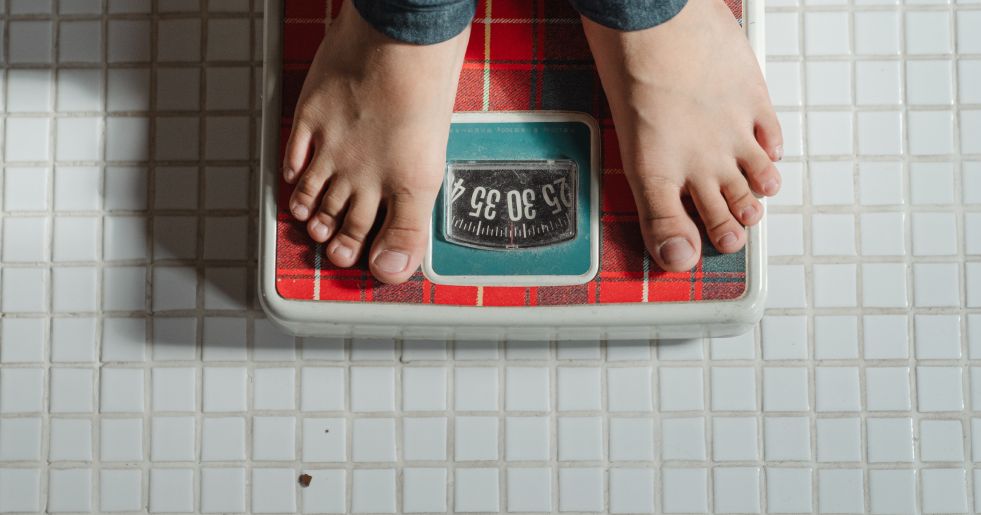{{ banner_block|raw }}
Common reasons for a weight loss plateau
Weight is subject to physiological fluctuations, it does not decrease constantly and linearly. If the scale won’t budge, your body may be adjusting to the changes you’ve made. This is how it adapts to the changes that have occurred and it needs time for this.
Weight loss takes time — and it’s not always a straight line. As your body burns fat, fat cells don’t disappear — they simply shrink. Because fat tissue isn’t uniform, these shrinking cells shift and settle differently. At the same time, the body reduces the number of capillaries that once supported those fat stores.
During this phase, your weight may stall — but that doesn’t mean progress has stopped. You may still notice your body getting leaner, with reduced measurements and visible changes in shape.
Try tracking your body measurements instead of relying solely on the scale.
Tracking body measurements is especially important if you’re strength training. Muscle is denser than fat, so even as your body becomes leaner, the number on the scale might not change — or it might even go up.
That’s totally normal. Instead of stressing about the scale, use a tape measure to track changes in your waist, hips, arms, and other key areas. Losing inches is a clear sign that your body is changing, even if the weight doesn’t reflect it yet.
Other reasons the scale isn’t moving
Water retention
It’s common to experience temporary water retention or muscle swelling after starting a new workout routine. This is normal, and after a period of adaptation to physical activity, water retention will subside. The main thing is to remain hydrated. Although at first, this may also affect your weight.
Need support on your journey? Join our program and get 70% off — use code code MEDIUM
Overly intense training
Overtraining can spike cortisol levels — the stress hormone linked to fat retention and slowed metabolism. While short-term stress can help your body adapt, constant physical stress from intense workouts may backfire. It can throw off your hormonal balance and make it harder to lose weight, even if you're doing everything “right.”
Strict diet
If you are on a low-calorie diet, after 3ー4 weeks your weight loss will stop. The body perceives extremely low calorie content as starvation and goes into survival mode.

It will begin to slow down the metabolism and start conserving energy by storing fat, even from small meals.
{{post_20|raw}}
Hidden calories
Over time, it’s easy to get more relaxed with tracking, leading to unintentional calorie creep. An extra spoonful of sugar or honey here, a cup of latte, a chocolate bar, a burger on the go — you may be consuming more calories than you think and don’t even realize it. As a result, your weight stays the same or increases, just a few hundred extra calories a day can wipe out your deficit, which leads to a surplus (intake exceeds expenditure).
Looking for healthy recipes? Don’t miss our helpful collection — simple, tasty, and good for you! 💚
Lack of sleep
Why might your weight stay the same if you’re not sleeping enough? Because your body doesn’t get a chance to fully recover. When you’re sleep-deprived, your mood can dip and your nervous system can’t reset properly. Your metabolism slows down, and your body starts producing more ghrelin — the hormone that increases hunger — while lowering levels of leptin, the hormone that tells you when you’re full. As a result, your body may start storing fat more efficiently, even from smaller portions of food.
{{post_21|raw}}
How to break through a weight loss plateau
Introduce new types of training
Perhaps your body has adapted and adjusted to monotonous physical activity. Try something new — switch from your usual routine to a different workout style. Replace Pilates with dance training, and add strength training with flexibility or stretching.

Various physical activities will speed up your metabolism.
Focus on cardio
Cardio helps boost your heart health, burn more calories, and support fat loss.To see the effect, you need to train for at least 30 minutes three times per week.
Rest well
If your body doesn’t have time to recover after intense workouts, your progress can stall. Overtraining can lead to fatigue, hormone imbalances, and — ironically — a weight loss plateau. Make sure to give yourself 1–2 rest or active recovery days each week, especially after moderate to intense fitness classes. Your muscles need time to rebuild, and rest is where the real magic happens.
Take an honest look at your diet
As you lose weight, your body needs fewer calories. Recalculate your intake and adjust your deficit accordingly. Use a tracking app or food journal to stay consistent and accountable.
{{post_14|raw}}
The weight loss plateau is another step towards success
View weight loss plateau as a natural and necessary part of your journey towards success.
Think of it as a pause for progress — not a sign to give up. Stagnation is inevitable — the body cannot constantly progress upward. It needs time to rest, adapt, and solidify its progress.
You may experience several such periods of adaptation along the way. Remember, the ultimate goal isn’t just to lose weight but to reach and maintain your desired weight — a process that includes long-term stability, or a "plateau," as part of the journey.
The key is to stay motivated and resilient on your path. Keep moving forward, and you will succeed!

















